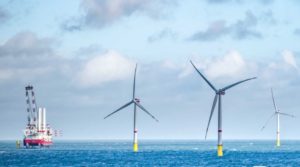 NEW BEDFORD – Vineyard Wind announced last week that it will implement recommendations from University of Massachusetts Dartmouth’s School for Marine Science and Technology to guide the wind energy project’s fisheries monitoring studies during construction.
NEW BEDFORD – Vineyard Wind announced last week that it will implement recommendations from University of Massachusetts Dartmouth’s School for Marine Science and Technology to guide the wind energy project’s fisheries monitoring studies during construction.
The school’s studies will begin later this spring.
In 2017, Vineyard Wind entered into an agreement with SMAST through which the wind developer asked the school to design a broad-based approach to research capable of supporting long-term and regional studies, along with monitoring of construction impacts.
Researchers tested a pilot video trawl system that uses technology to count and identify fish as they pass through an open net.
“The study itself has other various aspects that would be involved that include a range of more local-scale monitoring in the area of the construction, but also looking at the larger-scale patterns and how they might change over time,” said Steve Lohrenz, the Dean of the School for Marine Science and Technology at UMass Dartmouth.
The Vineyard Wind project will construct an 800-megawatt wind farm 15 miles south of Martha’s Vineyard. The wind energy project remains on schedule to being on-shore construction in 2019 and become operational by 2021.
SMAST also conducted four workshops with the region’s fishing industry during November and December to identify priorities for assessments of impacts on fisheries and ecological conditions that are associated with offshore wind development.
“This will have ongoing interaction with the fishing industry,” Lohrenz said. “Fishing vessels would be involved, ideally, in the survey activities. The fishing representatives would be consulted then on the findings.”
SMAST recommended a series of methodologies for fisheries monitoring and research based on input from more than 75 commercial and recreational fishermen who participated in workshops.
The methodologies include:
- Research procedures that encompass an array of species, ranging from fish caught with fixed gear to those caught with trawls to samplings of juvenile life stages
- Integrated methodologies that will support additional and/or on-going fisheries research
- Use of a “nested and modular” study design that can be used for both the relatively small area studied during construction monitoring but also utilized effectively for longer-term studies across the wider region
- Creation of a standing committee/working group of commercial fishermen to review findings and, if needed, make recommendations based on initial findings while studies are underway
- Use of local fishermen to provide vessels in support of the studies
Lohrenz said the goal of the studies is to be aware of any impacts to local fisheries from the construction of the wind farm.
“This has been a collaborative effort involving a lot of different groups and stakeholders and I think the idea is that it will continue to be that as the process develops,” Lohrenz said.























